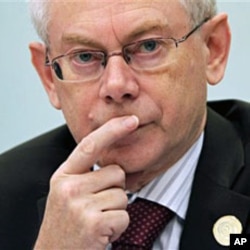The Danube river flows not just through Budapest, but also three other national capitals - more than any other in the world.
Now Hungary, which takes over the European Union's presidency on New Year's Day, wants money to flow through the 14 nations bordering the river.
The Danube Strategy aims to improve the lives of over 115 million people living near one of Europe's main waterways, which houses some of Europe's poorest areas, mainly in Bulgaria and Romania, but also some of the richest - in Germany and Austria.
The strategy, expected to be adopted by the EU, involves modernizing road, rail and river infrastructure, attracting more tourists, creating a regional energy market and reinforcing security while protecting the environment.
Besides the Danube Strategy, Hungary's EU presidency will also be dominated by efforts to approve new fiscal discipline to prevent a repetition of the current economic crisis in the Union and the region of countries that adopted the single European currency, the "eurozone".
But Hungary's conservative-leaning government is concerned that these ambitious plans can not be realized if Europe does not reverse its trend of an aging population.
Foreign Minister Janos Martonyi says Europe needs more children and explains that Hungary wants to use its stint as EU president to introduce a discussion on 'family values,' and to propose that 2014 be declared a 'European Year of the Family.'
"We know very well that it's very difficult to make Europe the most competitive region of the world with a shrinking and aging population, without confronting the demographic challenge," said Martonyi. "That is why we want to speak about family, social inclusion, fight against poverty. We very much hope that a frame work strategy will be adopted about a whole European question which is the integration of the Roma's."
Apart from the EU's social and economic challenges, Hungary also wants to use its presidency to complete membership talks with neighboring Croatia and move forward negotiations with the other EU hopefuls, including western Balkans states, as well as Iceland and Turkey.
The President of the European Council Herman Van Rompuy has welcomed the initiative, despite opposition from some member states who are concerned about the costs of further enlargement. He expects EU entry talks with Turkey to gain momentum during Hungary's presidency.
"In 2005 the accession negotiations were opened. These are difficult and complex. But there is a chance we can make more progress next year," he said. "Turkish reforms efforts, partly achieved to adhere to EU standards, have delivered impressive results. And, at the same time Turkey plays an ever more active role in its neighborhood mediating between Syria and Israel [and] in its improving contacts with Armenia, one of the six Eastern Partnership countries."
Van Rompuy also praised Hungary for organizing the Eastern Partnership summit with former Soviet Union states, aimed at improving energy security for Europe.
"Next May the Hungarian presidency will host a second summit of the Eastern Partnership in Budapest. They are Armenia, Azerbaijan and Georgia, Belarus, Moldova and Ukraine. This Partnership has significant growth capacity. For instance it is critically important for Europe's energy supplies," Van Rompuy said.
"Simply put: Energy security for Europe both in terms of the reliable functioning of the transit network and the potential diversification of sources can not be imagined without the involvement of our Eastern partners," Rompuy added.
Additionally, Hungary wants to make it easier for potentially millions of ethnic Hungarians living in neighboring countries to receive Hungarian passports.
Klaudia Bujdos sees Hungary's EU presidency as the most important political event since the country's communist regime collapsed in 1989 - the same year that she was born.





